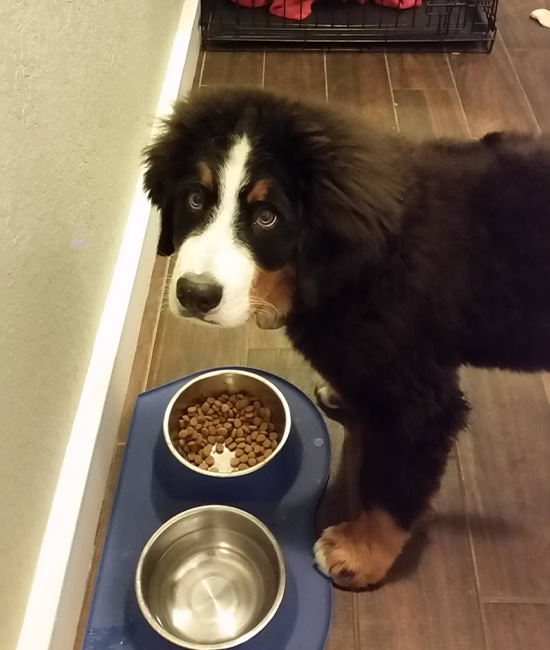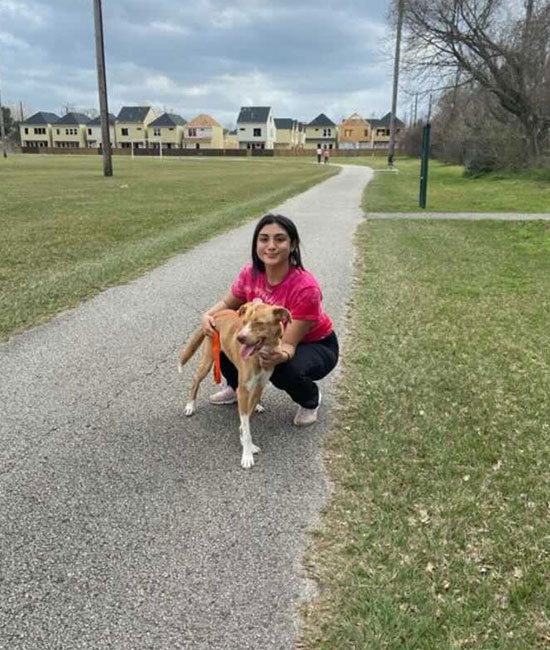Dog Health
Everything you need to know to keep your companion healthy and safe.
Healthy, Happy Dog
Dogs rely on their companions for care, so it is important that pet owners are educated on how to provide proper nutrition and exercise for their dog. A dog’s nutritional needs is based on their age, so check in with your veterinarian to see what type of food would best serve your pet’s needs.
Canine Nutrition

Your dog needs the right combination of carbs, proteins, fats, and vitamins in order for them to lead long and happy lives. Carbohydrates are essential for reproductive
health and increased brain activity. Providing your dog with adequate fiber will help them process food correctly. However, high-fiber foods are not ideal for young, growing dogs and dogs with high energy. Protein is an essential component of a cell and is absolutely necessary for your dog’s health. This can come from meats, fish, cooked eggs, vegetables and soy. Never feed your dog raw eggs because it can be damaging to their health. Your dog needs vitamins and minerals in their diet for proper metabolic function.
However, dogs do not need a large quantity of vitamins, and they are more likely to be over supplemented rather than have a deficiency. Always tell your veterinarian everything you are feeding and providing for your dog so as to not over supplement them. Excess vitamins can cause joint pain, brittle bones, and dry skin. Fats provide your dog with twice the amount of food energy that proteins and carbs do. They also protect your pet’s internal organs. If your dog is deficient in essential fats, they may experience stunted growth or skin irritations.
Be honest with your veterinarian about your pet’s diet and any reactions they may be experiencing. Together, you can work with your vet to determine what the best nutritional plan would be. +
However, dogs do not need a large quantity of vitamins, and they are more likely to be over supplemented rather than have a deficiency. Always tell your veterinarian everything you are feeding and providing for your dog so as to not over supplement them. Excess vitamins can cause joint pain, brittle bones, and dry skin. Fats provide your dog with twice the amount of food energy that proteins and carbs do. They also protect your pet’s internal organs. If your dog is deficient in essential fats, they may experience stunted growth or skin irritations.
Be honest with your veterinarian about your pet’s diet and any reactions they may be experiencing. Together, you can work with your vet to determine what the best nutritional plan would be. +
Canine Exercise

Dogs need daily exercise to remain happy and healthy. As a bonus, exercising with your dog will also improve your relationship in the process. There are plenty of ways
that you can spend some active time with your pet. Go on a hike, take a walk, play catch, go to a dog park, swim, or go to the beach. Exercising your dog every day will help them live a long and happy life, and it will also improve their mental health. Whether it’s just the two of you, or if you spend time with other dogs, socialization is a key component to having a happy dog.
If your dog has behavioral issues, it may just be because they require more exercise. Dogs that rip up pillows or chew on shoes tend to need more time running around. This behavior is due to pent up frustration and lack of stimulation. If you find that your dog is being destructive around the house, try taking them out for a game of fetch instead of resorting to scolding.
A dog’s exercise needs vary depending on their age, breed, and health history. Most dogs need about 30-60 minutes of exercise everyday, though it varies depending on temperament and ability. A geriatric dog still needs exercise, though the walks can be shorter and spread out throughout the day. An energetic three-year-old labrador would need time mental stimulation and a lot of room for running, so they would be better suited for a trip to the park.
Consult with your veterinarian to determine your dog’s exercise needs and how you can actively participate in their health. +
If your dog has behavioral issues, it may just be because they require more exercise. Dogs that rip up pillows or chew on shoes tend to need more time running around. This behavior is due to pent up frustration and lack of stimulation. If you find that your dog is being destructive around the house, try taking them out for a game of fetch instead of resorting to scolding.
A dog’s exercise needs vary depending on their age, breed, and health history. Most dogs need about 30-60 minutes of exercise everyday, though it varies depending on temperament and ability. A geriatric dog still needs exercise, though the walks can be shorter and spread out throughout the day. An energetic three-year-old labrador would need time mental stimulation and a lot of room for running, so they would be better suited for a trip to the park.
Consult with your veterinarian to determine your dog’s exercise needs and how you can actively participate in their health. +


